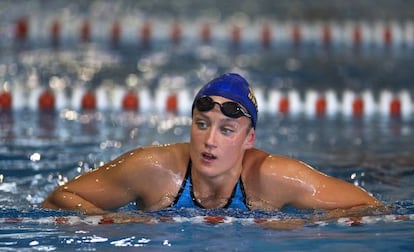It’s innovation versus desperation for the country’s sports federations
"Private sponsorship is the future," says the president of the Spanish Tennis Federation

Spanish Olympic sport is facing a financial desert. Subsidies from the Higher Sports Council (CSD) have dried up, while 25 of the nation's 63 federations have been declared technically bankrupt. The penury - which, above all else, affects minority sports - has placed the very existence of some of those at the highest level in serious doubt. The amount of funds going to the federations has been slashed by 34 percent. But there are fields where the path has been opened to discreet abundance.
Javier Revuelta, president of the Spanish Equestrian Federation, is one of the fortunate few. His answer to the situation is one of classic innovation, which combines three globally renowned aspects of Spanish industry: horse-rearing, tourism and sport.
"The plan we put into place in 2012 is one of the keys to organized equestrianism and a principal generator of our own resources," he says. "In Spain there are 700,000 horses, the equine industry contributes five billion euros to GDP and maintains 60,000 jobs. We have paid our debts to the CSD and gone from an 80-percent to 20-percent split between subsidies and money generated by ourselves, to exactly the opposite proportion."
We have a budget of two million euros, and 50 percent of that is coming from our own pocket"
Judo is following a similar trend, despite not enjoying the success rates of other sports at Olympic level.
"We have a budget of two million euros, and for the first time 50 percent of that is coming from our own pocket," explains Juan Carlos Barcos Nagore, the president of Spain's judo federation. "We are not in debt. The CSD gives us 840,000 euros and the rest comes from licenses or fees for examinations for belts, courses, qualifications and membership. As well as looking for sponsors, organizing events in Spain is a solution. Places such as Andalusia have low-cost airline coverage and low hotel costs outside of the high season. The European Cup held in Fuengirola is one example."
"Private sponsorship is the future," says José Luis Escañuela, the president of the Spanish Tennis Federation, which is bankrolled by insurer Mapfre. "Tourism and sport have to be integrated."
Success is no guarantee of survival, however. Fernando Carpena, head of the Spanish Swimming Federation, has seen his budget slashed despite recent glories in the pool. "We are technically bankrupt," he says. "We have just had our most successful World Championships, with 12 medals, but we cannot sustain that level for high-level competition on 40 percent less than we received in 2009. Either we react to the situation or we will go backward competitively. The administration needs to give us something. Top competition, which represents the country internationally, should be provided for by public funds."
Tu suscripción se está usando en otro dispositivo
¿Quieres añadir otro usuario a tu suscripción?
Si continúas leyendo en este dispositivo, no se podrá leer en el otro.
FlechaTu suscripción se está usando en otro dispositivo y solo puedes acceder a EL PAÍS desde un dispositivo a la vez.
Si quieres compartir tu cuenta, cambia tu suscripción a la modalidad Premium, así podrás añadir otro usuario. Cada uno accederá con su propia cuenta de email, lo que os permitirá personalizar vuestra experiencia en EL PAÍS.
¿Tienes una suscripción de empresa? Accede aquí para contratar más cuentas.
En el caso de no saber quién está usando tu cuenta, te recomendamos cambiar tu contraseña aquí.
Si decides continuar compartiendo tu cuenta, este mensaje se mostrará en tu dispositivo y en el de la otra persona que está usando tu cuenta de forma indefinida, afectando a tu experiencia de lectura. Puedes consultar aquí los términos y condiciones de la suscripción digital.








































